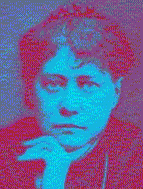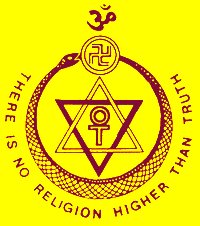The Key to Theosophy

Helena
Petrovna Blavatsky
1831
-1891
_______________________
The Key to Theosophy
By
Helena Petrovna Blavatsky
What is Memory According
to
Theosophical Teaching?
Q. The most difficult thing for you to do, will be to explain and
give
reasonable grounds for
such a belief. No Theosophist has ever yet succeeded in
bringing forward a single
valid proof to shake my skepticism. First of all, you
have against this
theory of reincarnation, the fact that no single man has yet
been found to
remember that he has lived, least of all who he was, during his
previous life.
A. Your argument, I see, tends to the same old objection; the loss
of memory in
each of us of our
previous incarnation. You think it invalidates our doctrine?
My answer is that it does not, and that at any rate such an
objection cannot be
final.
Q. I would like to hear your arguments.
A. They are short and few. Yet when you take into consideration (a)
the utter
inability of the best
modern psychologists to explain to the world the nature of
mind; and (b)
their complete ignorance of its potentialities, and higher states,
you have to
admit that this objection is based on an a priori conclusion drawn
from prima facieand circumstantial evidence more than anything else.
Now what is "memory" in your conception, pray?
Q. That which is generally accepted: the faculty in our mind of
remembering and
of retaining
the knowledge of previous thoughts, deeds, and events.
A. Please add to it that there is a great difference between the
three accepted
forms of memory.
Besides memory in general you have Remembrance,
Recollection,and Reminiscence,
have you not? Have you ever thought over the
difference? Memory,
remember, is a generic name.
Q. Yet, all these are only synonyms.
A. Indeed, they are not-not in philosophy, at all events. Memory is
simply an
innate power in thinking
beings, and even in animals, of reproducing past
impressions by an
association of ideas principally suggested by objective things
or by some
action on our external sensory organs. Memory is a faculty depending entirely
on the more or less healthy and normal functioning of our physical brain; and remembranceand recollection are
the attributes and handmaidens of that memory. But reminiscence is an entirely
different thing.
Reminiscence is defined by the modern psychologist as something
intermediate between remembrance and recollection,or "a conscious process of recalling past
occurrences, but without that full and varied reference to particular things
which
characterizes
recollection." Locke, speaking of recollection and remembrance,
says:
When an idea again recurs without the operation of the like object
on the
external sensory, it
is remembrance;if it be sought after by the mind, and
with
pain and endeavor
found and brought again into view, it is recollection.
But even Locke leaves reminiscence without any clear definition,
because it is
no faculty or
attribute of our physical memory, but an intuitional perception
apart from and
outside our physical brain; a perception which, covering as it
does (being
called into action by the ever-present knowledge of our spiritual
Ego) all those visions in man which are regarded as abnormal-from
the pictures
suggested by genius to
theravings of fever and even madness-are classed by
science as having no
existence outside of our fancy. Occultism and Theosophy,
however, regard
reminiscence in an entirely different light. For us, while
memory is physical
and evanescent and depends on the physiological conditions of the brain-a
fundamental proposition with all teachers of mnemonics, who have the researches
of modern scientific psychologists to back them-we call
reminiscencethe memory of
the soul. And it is this memory which gives the
assurance to almost
every human being, whether he understands it or not, of his
having lived before
and having to live again. Indeed, as Wordsworth has it:
Our birth is but a sleep and a forgetting,
The soul that rises with us, our life's star,
Hath elsewhere had its setting,
And cometh from afar.
Q. If it is on this kind of memory-poetry and abnormal fancies, on your
own
confession-that you base
your doctrine, then you will convince very few, I am
afraid.
A. I did not "confess" it was a fancy. I simply said that
physiologists and
scientists in general
regard such reminiscences as hallucinations and fancy, to
which learned
conclusion they are welcome. We do not deny that such visions of the past and
glimpses far back into the corridors of time, are not
abnormal, as
contrasted with our
normal daily life experience and physical memory. But we do maintain with Professor
W. Knight, that: The absence of memory of any action done in a previous state
cannot be a conclusive argument against our having lived through it.
And every fair-minded opponent must agree with what is said in
Butler's Lectures on Platonic Philosophy:
That the feeling of extravagance with which it (preexistence)
affects us has its
secret source in
materialistic or semi-materialistic prejudices.
Besides which we maintain that memory, as Olympiodorus
called it, is simply
fantasy, and the
most unreliable thing in us.
Says Olympiodorus, in Platonis
Phaed.:
The fantasy is an impediment to our intellectual conceptions; and
hence, when we are agitated by the inspiring influence of the Divinity, if the
fantasy
intervenes, the
enthusiastic energy ceases: for enthusiasm and the ecstasy are
contrary to each
other. Should it be asked whether the soul is able to energize
without the fantasy,
we reply, that its perception of universals proves that it
is able. It has
perceptions, therefore, independent of the fantasy; at the same
time, however,
the fantasy attends in its energies, just as a storm pursues him
who sails on the
sea.
Ammonius Saccas asserted that the only faculty in man directly
opposed to
prognostication, or looking into
futurity, is memory. Furthermore, remember that
memory is one thing
and mind or thought is another; one is a recording machine,
a register
which very easily gets out of order; the other (thoughts) are eternal
and
imperishable. Would you refuse to believe in the existence of certain things
or men only
because your physical eyes have not seen them? Would not the
collective testimony of
past generations who have seen him be a sufficient
guarantee that Julius
Caesar once lived? Why should not the same testimony of
the psychic
senses of the masses be taken into consideration ?
Q. But don't you think that these are too fine distinctions to be
accepted by
the majority of
mortals?
A. Say rather by the majority of materialists. And to them we say, behold: even
in the short
span of ordinary existence, memory is too weak to register all the
events of a
lifetime. How frequently do even most important events lie dormant
in our memory
until awakened by some association of ideas, or aroused to
function and activity
by some other link. This is especially the case with
people of advanced
age, who are always found suffering from feebleness of
recollection. When,
therefore, we remember that which we know about the physical and the spiritual
principles in man, it is not the fact that our memory has
failed to record
our precedent life and lives that ought to surprise us, but the
contrary, were it to
happen.
__________________________

Find answers to more questions
with
these Theosophy links
Dave’s
Streetwise Theosophy Boards
The Theosophy Website that
Welcomes Absolute Beginners
If you run a Theosophy Study Group,
please feel free
to make use of the
material on this Website
The Most Basic Theosophy
Website in the Universe
A quick overview of Theosophy
and the Theosophical Society
If you run a Theosophy Study Group you
can use this as an introductory handout.

Cardiff Theosophical Society meetings
are informal
and there’s always a cup of tea afterwards
The
Cardiff Theosophical Society Website
The
National Wales Theosophy Website
This is for
everybody not just people in Wales
Theosophy Cardiff’s Instant Guide
General pages
about Wales, Welsh History
and The History of
Theosophy in Wales
Independent Theosophy Blog
One liners and quick explanations
About aspects of Theosophy
H P Blavatsky is usually the only
Theosophist that most people have
ever
heard of. Let’s put
that right
Lentil burgers, a
thousand press ups before breakfast and
the daily 25 mile
run may put it off for a while but death
seems to get most of
us in the end. We are pleased to
present for your
consideration, a definitive work on the
subject by a Student of
Katherine Tingley entitled
An
Independent Theosophical Republic
Links to Free Online Theosophy
Study Resources; Courses, Writings,
No
Aardvarks were harmed in the
The Spiritual Home of Urban Theosophy
The Earth Base for Evolutionary Theosophy
Classic Introductory
Theosophy Text
A Text Book of Theosophy By C
What Theosophy Is From the Absolute to Man
The Formation of a Solar System The Evolution of Life
The Constitution of Man After Death Reincarnation
The Purpose of Life The Planetary Chains
The Result of Theosophical Study
An Outstanding
Introduction to Theosophy
By a student of
Katherine Tingley
Elementary Theosophy Who is the Man? Body and Soul
Body, Soul and Spirit Reincarnation Karma
Preface
Theosophy and the Masters General Principles
The Earth Chain Body and Astral Body Kama – Desire
Manas Of
Reincarnation Reincarnation Continued
Karma Kama Loka
Devachan
Cycles
Arguments Supporting Reincarnation
Differentiation Of Species Missing Links
Psychic Laws, Forces, and Phenomena
Psychic Phenomena and Spiritualism
Quick Explanations with Links to More
Detailed Info
What is Theosophy ? Theosophy Defined (More Detail)
Three Fundamental Propositions Key Concepts of Theosophy
Cosmogenesis
Anthropogenesis
Root Races
Karma
Ascended Masters After Death States
Reincarnation
The Seven Principles of Man Helena Petrovna Blavatsky
Colonel Henry Steel Olcott William Quan Judge
The Start of the Theosophical Society Theosophical Society Presidents
History of the Theosophical Society Glossaries of Theosophical Terms
History of the Theosophical Society in Wales
The Three Objectives of the Theosophical Society
Explanation of the Theosophical Society Emblem
Karma Fundamental Principles Laws: Natural and Man-Made The Law of Laws
The Eternal Now
Succession
Causation The Laws of Nature A Lesson of The Law
Karma Does Not Crush Apply This Law
Man in The Three Worlds Understand The Truth
Man and His Surroundings The Three Fates The Pair of Triplets Thought, The Builder
Practical Meditation Will and Desire
The Mastery of Desire Two Other Points
The Third Thread Perfect Justice
Our Environment
Our Kith and Kin Our Nation
The Light for a Good Man Knowledge of Law The Opposing Schools
The More Modern View Self-Examination Out of the Past
Old Friendships
We Grow By Giving Collective Karma Family Karma
National Karma
India’s Karma
National Disasters
Try these if you are looking
for a
local Theosophy Group or Centre
UK Listing of Theosophical Groups